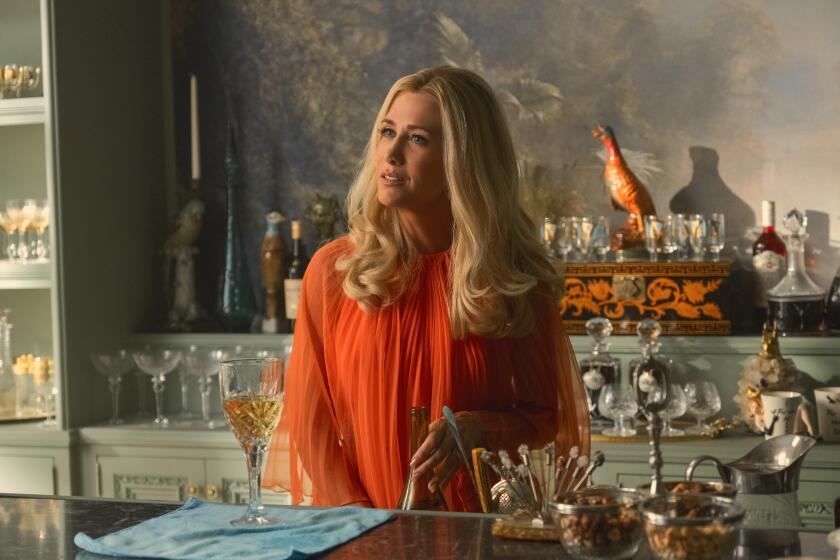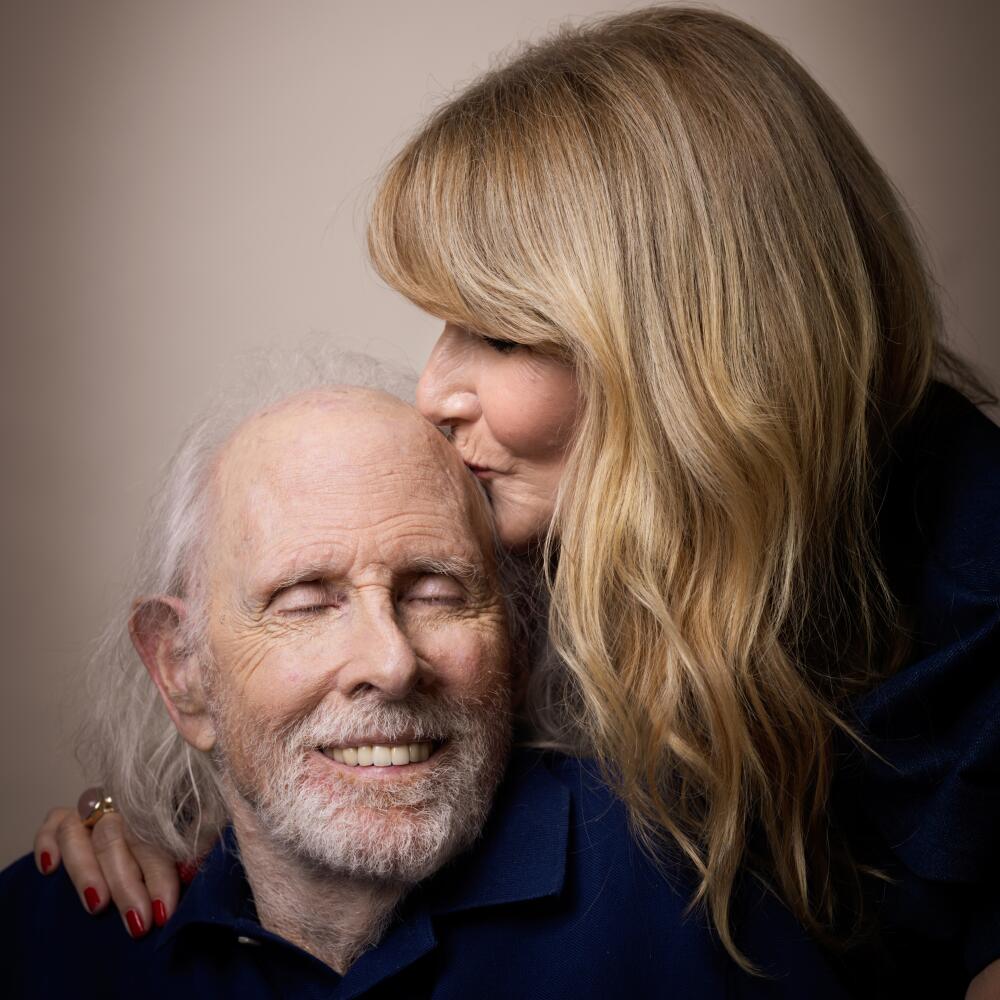
- Share via
Laura Dern and her father, veteran actor Bruce Dern, are in a room together and, within minutes, the stories begin.
There was talk about the advice he received from the giants that orbited his life — like Elia Kazan, whom Bruce studied under at the Actor’s Studio in New York. Bruce — whose family included prominent politicians, businessmen and a poet — was moving to L.A. in the 1960s, and the legendary director told him, “When you get out there, no one’s going to give a f— about who you are or what your name is or anything.”
There was talk about his best Dernsies — the term coined by his longtime friend Jack Nicholson to describe Dern’s habit of going off script to find authentic moments for his characters: “They’re not just a pat on my back. They’re just 17 years of playing the fifth cowboy from the right. I never had more than five lines in a whole movie,” Dern says, sprinkling examples from films including 1978’s “Coming Home” and 2019’s “Once Upon a Time ... in Hollywood” throughout the conversation.
Bruce is 87 now. With an acting career that has spanned more than half a century in films like “The Incredible 2-Headed Transplant,” “The Great Gatsby” and “Nebraska,” he has a lot of stories to tell. And there’s more ahead. While many would relish slowing down, he’s still pushing himself creatively — this time with help from Laura, who has forged her own acclaimed career in film and television as an actor and producer.
Apple TV+’s “Palm Royale,” premiering Wednesday, is a loose adaptation of Juliet McDaniel’s 2018 novel that’s been re-created into diverting television.
Laura and Bruce mine their tender bond as father and daughter for “Palm Royale,” Apple TV+’s vibrant and outrageous 1960s-set comedy. Based on Juliet McDaniel’s novel “Mr. and Mrs. American Pie” and adapted for television by Abe Sylvia (“George & Tammy”), the series revolves around the exploits of social climber Maxine Simmons (Kristen Wiig). She’s desperately trying to earn a spot on the social ladder in the glamorous and exclusive community of Palm Beach, Fla., where her estranged and now-comatose aunt-in-law (Carol Burnett) ruled for decades. There, Maxine encounters Linda Shaw (Laura Dern, who is an executive producer on the series), a feminist activist and owner of a bookstore with a past she can’t fully escape; and her rich father, Skeet (Bruce Dern), who is ailing while his wife, Evelyn (Allison Janney), vies for Palm Beach’s top spot in the social hierarchy.
It’s the first time — officially, anyway — the Derns are sharing the screen.
From a hotel room in Pasadena, the father-daughter duo discussed how “Palm Royale” brought them together, the art of not rehearsing, and the Dernsie that made it into the show. This interview has been edited and condensed for clarity.
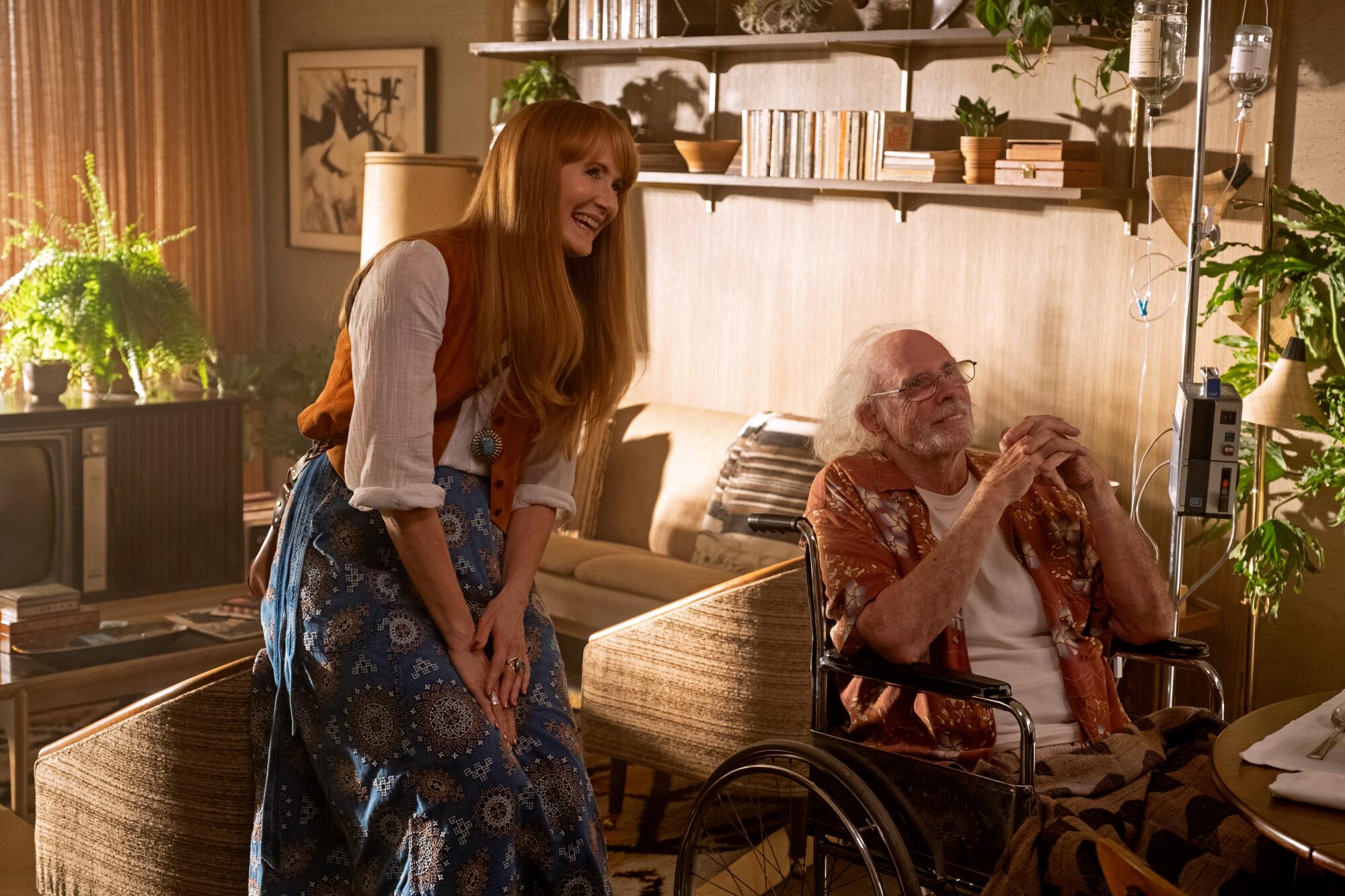
I’m surprised it took this long to have you two share screen time in this way. How did this come about?
Laura: It was a dream to finally get to work together. We’ve thought about it for a while. The gift of being a producer is you can be involved early in decisions, in the process of developing the characters, and what part to play. Abe had this brilliant idea of this other character, Linda, that had not been in the book, to really speak to a lot of the themes that I wanted to talk about. We thought, maybe there’s background that involves the family. That’s when Jayme Lemons, my producing partner, was like “Family? Is it a dad?” Because they all knew how we’d always longed for this.
When [Abe] pitched the idea of this relationship, I called Dad, who was working on two movies, because he never stops and is deeply sought after. I felt a little shy as a producer, because I didn’t want you [turning to Bruce] to feel like you had to do it. It was like, “is it a waste to finally work together and only have you a few scenes? Or are we going to jump at doing what we’ve wanted to do, certainly, my whole life?” Dad was so supportive and game and willing. I think it gave us a wonderful journey to explore deep themes about sins of the father, grief, ego and privilege.
Bruce: I was balancing this between two Tarantino movies: “The Hateful Eight” and “Once Upon a Time.”
Laura: But the fact that you said yes was our dream come true.
Had someone tried to get you guys on screen together before? You’ve both worked with director Alexander Payne — Laura in “Citizen Ruth” (1996), Bruce in “Nebraska” (2013). Has he ever said, “Hey, would you two ever ...?”
Bruce: Alexander Payne is the only guy who tried to put us together in a film. He did “Nebraska.”
Laura: Nobody knows he did it.
Bruce: What happens is, at the end of the movie, I’m driving the truck down the street, and the kid [Will Forte as David Grant] is letting me drive it. We go past an alley. And as I go past the alley, I don’t really look down it. But up the alley comes a waif-like-looking Laura and she comes up the alley, maybe about 20 yards, and climbs into a dumpster.
Laura: I was playing my character in “Citizen Ruth.” He was like, “You guys have never been in a movie together; get your clothes on, be Ruth, and just come down the alley and dive into a dumpster.” That was our first chance. But he [Alexander], actually — he has other things up his sleeve. We knew this [“Palm Royale”] would be our first real opportunity, but that we’ll have another one, hopefully, soon.
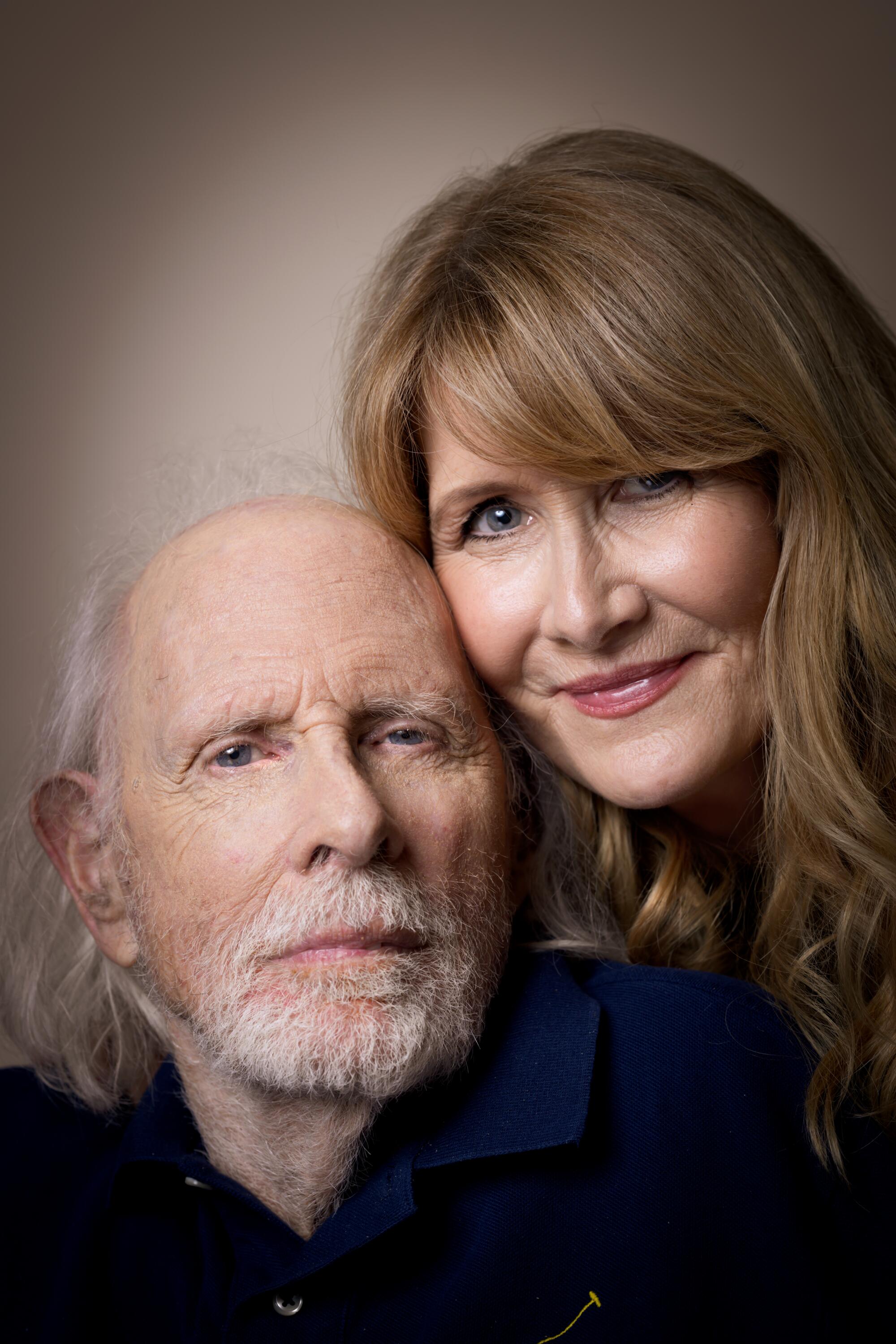
How was that first day on set together? I couldn’t help but notice the surplus of olives on the table.
Laura: Do you know why? Because our production designer Jon Carlos, who is so brilliant, came to me and said, “What does your dad love? What is his favorite food? What is his favorite drink?” I said, “Since I was a kid, he would always have, then a Pepsi, now a Coke, with olives in it.” So he gave you that big jar of olives and some Cokes. [Reporter’s note: Bruce had a tight grip around a glass of Coke during the interview.]
Bruce: Pimento olives. That was because I ran a lot. And there’s salt in olives. So you put a salty olive in a Coca-Cola or a Pepsi-Cola, and that was my drink.
Laura: So, what was it like for you, Dad? The first moment we were acting together [in “Palm Royale”]? I’m curious. I haven’t asked him that.
Bruce: I’m in my bed [in the scene]. And suddenly I hear a [softly mimics] “Helllllooo.” I look up and don’t see anything. I see a cake coming around a corner of a doorway with this face [points to Laura]. That was a surprise.
Laura: We tried not to get too rehearsal-y so that we capture —
Bruce: I don’t rehearse. Not just with her. I don’t do it because when I went through my whole idea of behavior, I found that the most crippling thing to the suddenness of real behavior to other actors is they need to hear themselves say the lines once to know if it’s right. The minute I walked out on set, it was obvious that she was the reason that I was there, but she was also the reason that the show was there. I’ve never produced a film. What I liked about this was we had no rules. If she took me down a certain path, I just personalized it totally and brought it back into our level of what we’re talking about. What happened was things came up that nobody expected to come up and the crew never moved; they never left the room. They stayed because that was the greatest applause for my way of having gone down this road now as an actor, was to let me try different things.
Lee Strasberg — I taught for him one time. He would come out here [to L.A.] in the summer, then he’d go back to New York in the winter. The Actor’s Studio had to go on and there were four of us that did the teaching — Mark Rydell, Lee Grant, Peggy Feury and Martin Landau. Lee gave all of us permission to go on. And Lee said, “But I want you to do your thing when you teach. I don’t want you to try and teach him how to act.” I said, “Acting is out. I’m trying to make them understand [whispers] ‘stop acting ... just let it happen.’”
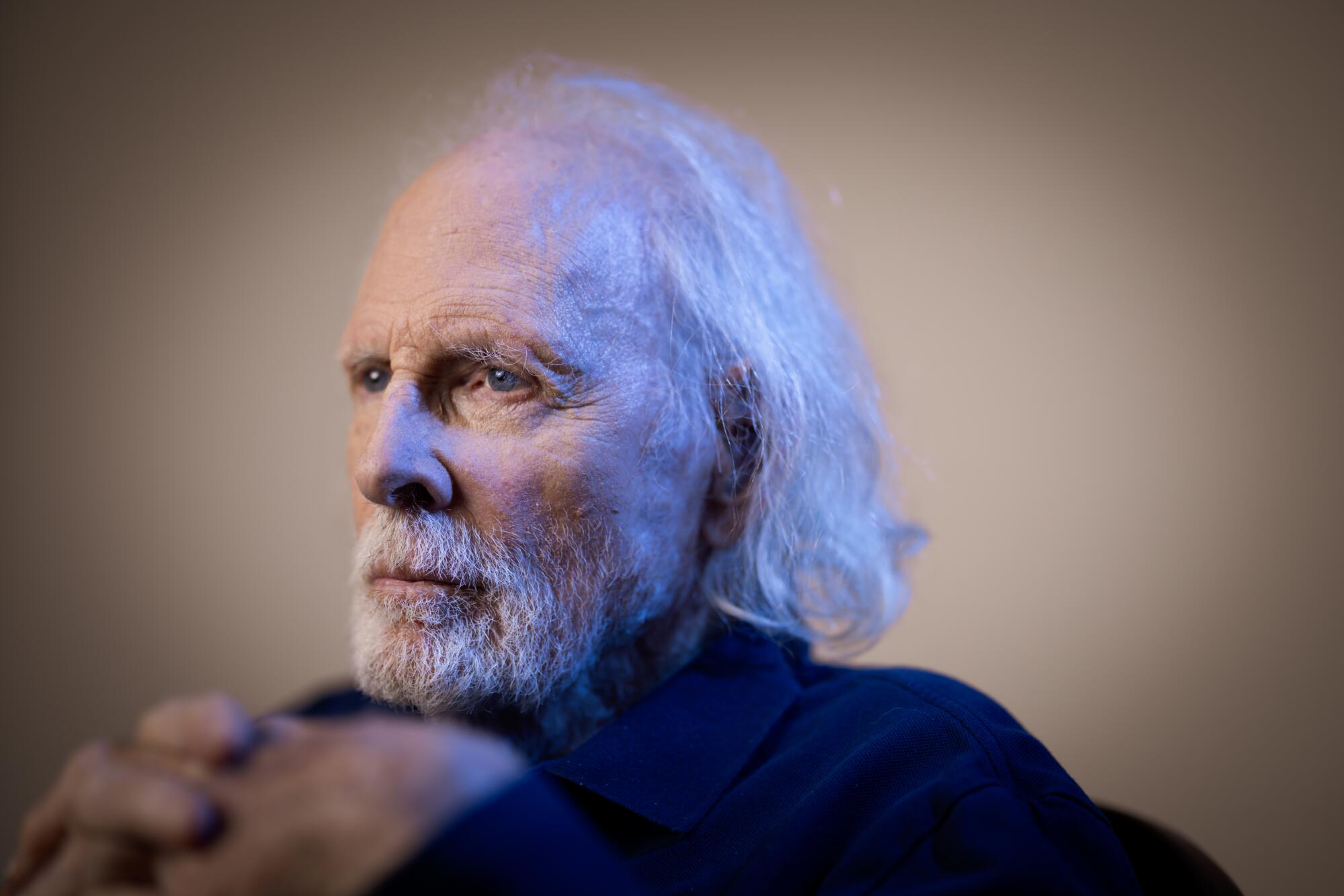
Laura, how was it to witness the Dernsies unfold while sharing a scene with him?
Laura: Well, the Dernsies are my favorite thing. I’ve been raised on movie sets with both my parents my whole life, so I wasn’t unfamiliar with them. But to be there with Ricky Martin [who plays Robert Diaz, a Korean War veteran and employee at the town’s country club] for our first scene, the three of us together —
Bruce: First of all, I’m blown away. Ricky Martin?! This is Menudo in my f— bedroom.
Laura: It was amazing.
Bruce: He was the nicest kid. And very professional.
Laura: I forget what his line was in the scene, but he asked you if you wanted something. And I think my dad’s response, for example, was supposed to be, “Are you kidding?” as in, “Of course.”
Bruce: Say the line and I’ll say what I said to Ricky Martin.
Laura: The whole crew is there, and Abe was talking to the [director of photography] and was like, “Maybe he’s going to give us a Dernsie.” It is a known thing. [Dad] turns and Ricky was so nervous. I was so nervous. [In the scene, Bruce’s Skeet asks Ricky’s Robert if he’s ever read Timothy Leary, the Harvard psychologist and LSD advocate.] Ricky said, “Should I?”
Bruce: I said, “Does Pinocchio have a wooden d—?”
Laura: Ricky and the whole crew laughed. Everyone stopped. They had the time of their life. That is in the show.
Bruce: Oh, it is?
Laura: Of course. Abe was like, “Are you kidding? They’re going to think I wrote it. We’re keeping it.”
Bruce: They’re all apropos to what’s going on. I don’t plan on what the words are gonna be. I know it all comes from here [points to chest]. It came because my original idea about acting was — it’s having the ability to be publicly private.
Laura: That’s what he’s always said to me and taught me. You’ve taught me, in addition to that, to not be afraid to keep pushing the boundaries on the kinds of explorations with flawed characters. As a teenager, when I was being offered the girlfriend part or whatever, my dad [said], “Go do three scenes in that movie where you’re playing this really unique character. Don’t go play the lead girlfriend in the Brat Pack movie or whatever” because he knew I wanted to develop as an actor.
Bruce: Acting is basically about having the ability to look and listen. And if you do that, things can happen.
The story of Skeet and Linda is a tragic one — there’s guilt, but there’s so much love and they’re grappling with his mortality, too. What was that like for you?
Laura: We won’t talk about exactly what happens, but the arc of the story is somewhat tragic. It all was going fine until we had to even consider that. I don’t think I loved that part. It was quite difficult to imagine.
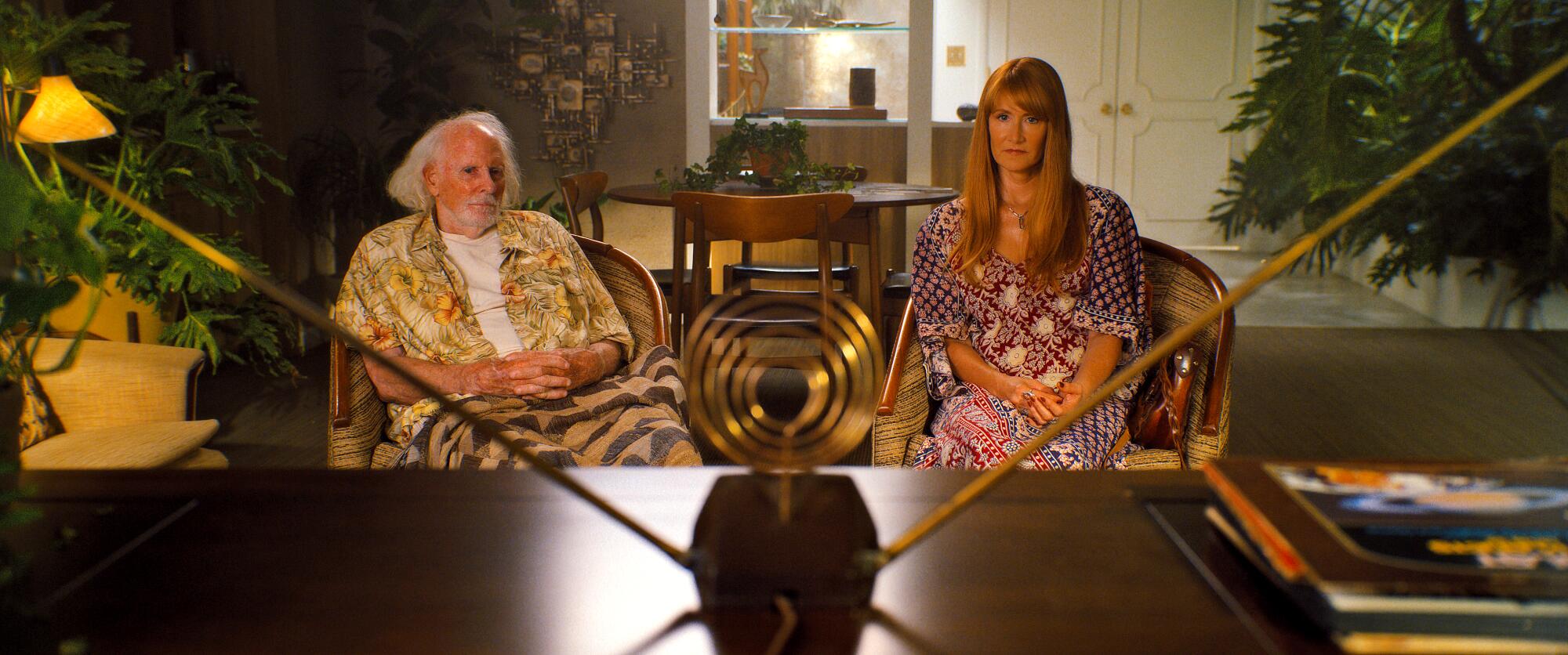
Bruce: We were as basic as we could be, talking about something we’ve never fully adventured into, and rightly so.
Laura: We just haven’t had those conversations in our relationship.
They’re such difficult conversations, no matter your age or stage in life. My mom will casually bring it up sometimes, like, “Here is where I keep all my important documents.” I don’t want to think about it.
Laura: Oh, yeah, no, the difference between the two of them: With my mother [Diane Ladd], we can all be sitting at Thanksgiving, and to my children she’s like, “Just you know, when something happens, I want you to take this, you to take that.” And I’m like, “Mom, can we not talk about it?” [My dad and I] just don’t go there. We pretty much have talked about everything except that.
Mr. Dern, is it a topic you’ve never been comfortable discussing?
Bruce: I never think about the event of dying. It’s grim opera. Everybody has the same opera coming.
Laura: My favorite thing that you say almost every day that we speak — I go “Hey, Pop. How are you?” You say, “I’m here.” That’s kind of what you sit with.
Bruce: I’ve said that since I was 7 years old.
Your character, at this stage in his life, says his biggest regret was not doing a ”thing with my life.” Do you think about regrets or what it is to fail?
Bruce: I don’t look back well. I’m not projecting the future either. I’m just kind of sailing along a day at a time, but with all the accouterments of everything I’ve had for 87 years.
They always say, “Why don’t you direct a movie?” Because it’s an art and I’m not an artist like that. All I know is I’m about behavior.
Laura, what is your earliest memory of seeing him on a set?
Laura: I was 6, I think, and Dad was doing the movie “Family Plot” [1976] for Alfred Hitchcock. He brought me to the set. I will never forget that. I don’t know if the crew did this, or what, but Hitchcock had his director’s chair. Remember? [turns to Bruce] They brought a little mini director’s chair and let me sit next to him.
Bruce: At lunch, they sat next to each other.
Laura: He told me stories and explained shots to me. He was really generous with your kid, Dad. That summer was a real turning point where I saw the relationship between a filmmaker and an actor. You guys had such an incredible shorthand that I fell in love with. I think I didn’t really understand acting, and necessarily the process of storytelling, but I fell in love with the way a director and an actor work together and come together. That relationship has been the great joy of my life. I always sought out a filmmaker-actor relationship that was like you with Hal Ashby [in “Coming Home”] or you with Hitchcock. I have had a few of those, like my relationship with David Lynch, and I think I longed for that because I saw that thing where they get you, where they could whisper a word and you’re like, “Yeah, I know what I’m doing.” You just have this instinctual, clear other language to yourselves. That was a huge influence.
Bruce: There’s two things I remember. First of all, it was probably 2 a.m. My phone rings and it’s the mother person [Laura’s mother] and she says, “Wake up! Your daughter’s screaming and yelling all over the house.”
Laura: Oh, yeah. This is a true story.
Bruce: “She just saw your head fall down the stairs in ‘Hush...Hush, Sweet Charlotte.’” They cut my head and my hand off in the movie. Bette Davis does it on purpose. So, I have to get on a phone with her. I said, “Hiiiiiiiiii, Lauraaaaaaaa. I’m way down heeeeeeere, my head is all the way down here.” Her mother immediately seized the phone. That was the same incident, the same movie. The other thing that happens to me, where I’m trying to get Laura to understand how to take advantage more of what’s actually going on around you in the movie you’re doing today. How can you take advantage of that? Listen. Pick up the vibe on the set. Find the tension. Find who’s uptight, find who isn’t.
You could write another book, Mr. Dern. The stories you recall.
Laura: They’re working on a documentary. I’m filming something for it. I’m going to be interviewed.
More to Read
The complete guide to home viewing
Get Screen Gab for everything about the TV shows and streaming movies everyone’s talking about.
You may occasionally receive promotional content from the Los Angeles Times.
